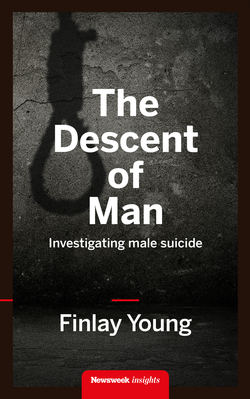Читать книгу The Descent of Man - Finlay Young - Страница 6
На сайте Литреса книга снята с продажи.
2 A Very Modern Suicide
ОглавлениеAlthough I’ve always been super chill, I’ve been feeling a lot of anger lately at the slightest thing, and I do not like it one bit.
Why do they leave? It’s a heart-wrenching, unavoidable question. Seeking to understand is, in a sense, to demand the impossible – to know what the dead were thinking. Suicide is an act that eliminates the testimony of the only witness who could really know the answer. Notes are only left behind in around a quarter of cases, final postscripts seeking to explain or blame, comfort or wound, often just to apologise for the hurt to follow. However, with the life progressions of the young now scrupulously etched online, sometimes more clues are left behind by those who leave far too early.
In most of his YouTube videos, the young man has headphones on, head twitching intently to the beat, fingers flashing up and down the fretboard of his bass guitar. His talent had gained him a following; some of these videos attracted 20, 30, even 40 thousand views. One is different. In it he sits in front of the camera without his guitar, just a boy, a red-haired, matter-of-fact boy. He’s shy and serious, quietly giving carefully thought-out answers to questions from his online following. His face, his eyes, are soft and vulnerable. This is Brett Robertshaw.
A few clicks leads to his page on Ask.fm, a site where young people answer questions about themselves posted by other users. Here, while Brett’s answers are generally funny, sharp and acerbic, a few give pause.
Question: What was the last lie you told? Brett: I’m ok. Question: Your (sic) in your own movie are you the good guy or the bad guy? and why? Brett: I’m the extra, because fuck that shit.
One click. An abruptly curtailed Twitter feed appears. Brett wrote over 7,500 tweets in under three years, an average of seven a day, to a band of 152 followers. No more do the random thoughts of the young dissipate into the air, or hide in diaries and journals. Scanning Brett’s tweets reveals much that is typical of a young male: his passionate opinions on boxing, his views on films and computer games, his slightly goofy banter. Records of infrequent train trips from his home in the northern seaside town of Blackpool to London. Persistent boredom with what he called the “’orrible north”. But then, among them, scattergun bursts of tweets suddenly crescendo forth from nowhere, expressing sadness and resignation.
13 April: It’s times like this that I just feel like I’m done, that there’s nothing I can do to feel better. I’m fighting a losing battle. 13 April: Somebody please remind me why I’m still here.
He reveals struggles to sleep. Coping with alcohol. Self-lacerating loneliness. A traumatic visit to a doctor. Medication. A mind-running over. A month on, in May, there seems more anger and fear.
10 May: Why is it so fucking difficult for me to function as a normal person, instead of being so damn useless? 10 May: No matter who says otherwise, I don’t feel like I have anybody that I can actually talk to anymore. I hate being this scared just to talk.
It seems it was a few days later, on 14 May, that Brett began to carefully write a long message for his personal website, a space normally reserved for posting bass guitar tablature. It began with a heart-breaking sentence. “The truth is, if this post is live, then chances are, I’m probably not here any more.”
With perfect grammar, he described a life “void of all emotions except sadness and worry”, where worst-case scenarios ruled and self-esteem was low. He wrote of “friendships” with inverted commas. His guitar playing, so impressive, so admired, was, he wrote, “just something that passed the time a bit”. To be complimented on it made him feel worse. When he finally sought treatment, worry about the appointments prevented him sleeping, while antidepressants made him feel nauseous. “Any attempt to get better,” he wrote, “seemed to go the opposite way and make me feel worse”. He concluded his letter by making it clear where he felt the blame lay. “It’s entirely my own fault, and only my own lack of willpower and strength of mind is to blame.”
He didn’t post the letter that day. His tweeting continued through June, but there would be no more sudden bursts of online sadness. On 2 July, Brett posted a final video to YouTube. In it, he mouths the words to the chorus of the alternative song he’s playing along with, never looking at the camera: “Oh my god there must be something, something to take the pain away. And so there’s nothing you can give me. It’s probably better off that way”.
On 5 July, the summer day when he ended his life at his home, Brett Robertshaw was still only 21 years old. Grieving family members speak of a young man who made them laugh. They never thought he was at that stage. The letter he had carefully typed out automatically posted to his website one week later.
